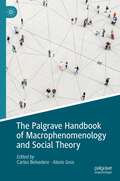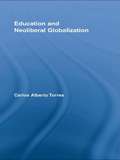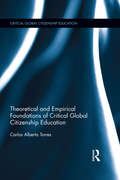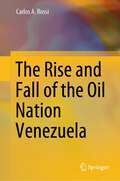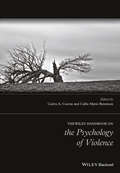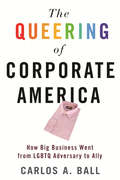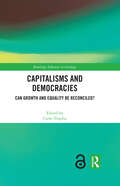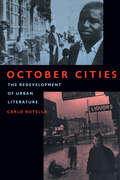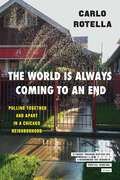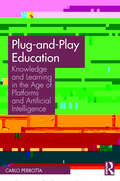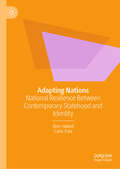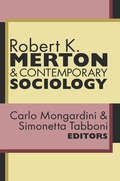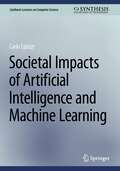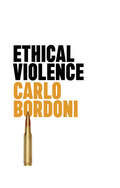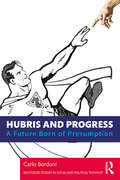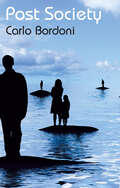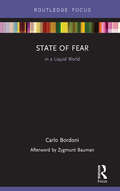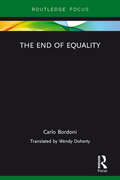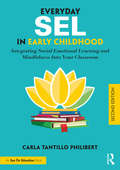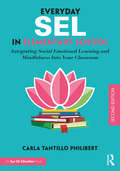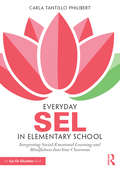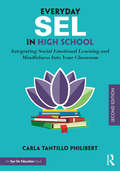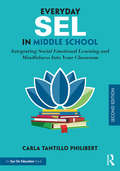- Table View
- List View
The Palgrave Handbook of Macrophenomenology and Social Theory
by Carlos Belvedere Alexis GrosThis Palgrave Handbook showcases how the phenomenological approach, especially but not only as developed by Alfred Schutz, can make important contributions to the theoretical analysis of macro-social phenomena such as the state, history, culture and interculturality, class relations and struggles, social movements and protests, capitalism, democracy, and digitalization processes. It gathers systematically and intellectual-historically oriented chapters that deal with these macro social phenomena from a phenomenological perspective. This handbook is mainly intended for a threefold audience: sociologists and social scientists at large – both theoretically and empirically oriented –, phenomenological sociologists, and phenomenological philosophers. This book includes chapters by international renowned specialists in social theory, phenomenological sociology, and phenomenology: Hartmut Rosa (University of Jena), Michael Barber (St. Louis University), Thomas Eberle (University of St. Gallen), Roberto Walton (Universidad de Buenos Aires), Jochen Dreher (University of Konstanz), Chung-Chi YU (National Sun Yat-sen University, Taiwan), and George Bondor (AI.I. Cuza University of Iasi, Romania), among others.
Education and Neoliberal Globalization (Routledge Research in Education #Vol. 18)
by Carlos Alberto TorresThis volume by noted critical education scholar Carlos Alberto Torres takes up the question of how structural changes in schooling and the growing impacts of neoliberalism and globalization affect social change, national development, and democratic educational systems throughout the world. The first section of the book offers analytical avenues to understand and criticize the practices and policies of neoliberal states, both domestically and internationally. More than a mere lament of the state of educational policy, however, Torres also documents the critiques and alternatives developed by social movements against neoliberal governments and policies. Ultimately, his work urges readers to engage in the struggle to resist the oppressive forces of neoliberal globalization, and proactively and deliberately act in informed ways to create a better world.
Theoretical and Empirical Foundations of Critical Global Citizenship Education (Critical Global Citizenship Education)
by Carlos Alberto TorresIn the first volume in the Critical Global Citizenship Education series, Torres combines theoretical and empirical research to present an original perspective on global citizenship education as a vitally important way of learning in a globalized world. In examining the requirements for effective global citizenship education and education reform, he investigates pathways to citizenship-building at the local, national and global levels and urges development of teaching methods, teacher education, and curriculum within a social justice education framework. Taking into account post-colonial perspectives, political realities at play, and practical implications, Torres provides a succinct but comprehensive understanding of how global citizenship education can expand the concept of civic education in a global society and interrupt inequality. This volume considers the ways that global citizenship education has been incorporated and is used by international institutions, governments, and the academy, and provides a clear framework for anyone struggling to make sense of the tensions and complexities of global citizenship education today.
The Rise and Fall of the Oil Nation Venezuela
by Carlos A. RossiThis book explains why Venezuela is so rich in natural resources—it has been producing oil since 1922 and harbors the largest oil reserves in the world—and yet it is also a failed nation of class-divided citizens exhibiting deep poverty in a corrupt, incompetent state. Venezuela is a bipolar nation, where two marked poles in the society exist which have historical origins and are mutually exclusive.The book provides a critical analysis of Venezuela's history, economy and politics and explains the context and implications of the bipolar poles, known as the elite pole and the resentful pole. Both, it shows, have done serious harm to Venezuela’s prosperity.The author describes the vicious circle of oil wealth, corruption, inefficiency and world market dependency and gives recommendations for a better future.
The Wiley Handbook on the Psychology of Violence
by Callie Marie Rennison Carlos A. CuevasThe Wiley Handbook on the Psychology of Violence features a collection of original readings, from an international cast of experts, that explore all major issues relating to the psychology of violence and aggressive behaviors. Features original contributions from an interdisciplinary cast of scholars - leading experts in their fields of study Includes the latest violence research – and its implications for practice and policy Offers coverage of current issues relating to violence such as online violence and cybercriminal behavior Covers additional topics such as juvenile violence, sexual violence, family violence, and various violence issues relating to underserved and/or understudied populations
The Queering of Corporate America: How Big Business Went from LGBTQ Adversary to Ally
by Carlos A. BallAn accurate picture of the LGBTQ rights movement's achievements is incomplete without this surprising history of how corporate America joined the cause.Legal scholar Carlos Ball tells the overlooked story of how LGBTQ activism aimed at corporations since the Stonewall riots helped turn them from enterprises either indifferent to or openly hostile toward sexual minorities and transgender individuals into reliable and powerful allies of the movement for queer equality. As a result of street protests and boycotts during the 1970s, AIDS activism directed at pharmaceutical companies in the 1980s, and the push for corporate nondiscrimination policies and domestic partnership benefits in the 1990s, LGBTQ activism changed big business's understanding and treatment of the queer community. By the 2000s, corporations were frequently and vigorously promoting LGBTQ equality, both within their walls and in the public sphere. Large companies such as American Airlines, Apple, Google, Marriott, and Walmart have been crucial allies in promoting marriage equality and opposing anti-LGBTQ regulations such as transgender bathroom laws. At a time when the LGBTQ movement is facing considerable political backlash, The Queering of Corporate America complicates the narrative of corporate conservatism and provides insights into the future legal, political, and cultural implications of this unexpected relationship.
Capitalisms and Democracies: Can Growth and Equality be Reconciled? (Routledge Advances in Sociology)
by Carlo TrigiliaThis book examines steadily-growing increases in inequality within Western capitalist democracies, examining with care the differences between these democracies rooted in their culture and institutions. It highlights the differences in growth and inequalities between different countries, pointing to the role of endogenous institutions that affect social inequalities as well as the relationship between redistribution and economic growth. The book presents extensive comparative research on institutional factors such as industrial relations, welfare systems, training and innovation policies. Paying attention to diverse types of democracies and to the main features of left-wing parties, the book highlights the importance of politics, and of different types of democracies, in shaping social inequalities and diverse development paths. It will appeal to students and scholars interested in economic and labour sociology, welfare studies, comparative political economy, comparative welfare, varieties of capitalism, and comparative politics. The Open Access version of this book, available at www.taylorfrancis.com, has been made available under a Creative Commons Attribution- Non Commercial-No Derivatives 4.0 license.
October Cities: The Redevelopment of Urban Literature
by Carlo RotellaReturning to his native Chicago after World War II, Nelson Algren found a city transformed. The flourishing industry, culture, and literature that had placed prewar Chicago at center stage in American life were entering a time of crisis. The middle class and economic opportunity were leaving the inner city, and Black Southerners arriving in Chicago found themselves increasingly estranged from the nation's economic and cultural resources. For Algren, Chicago was becoming "an October sort of city even in the spring," and as Carlo Rotella demonstrates, this metaphorical landscape of fall led Algren and others to forge a literary form that traced the American city's transformation. Narratives of decline, like the complementary narratives of black migration and inner-city life written by Claude Brown and Gwendolyn Brooks, became building blocks of the postindustrial urban literature.October Cities examines these narratives as they played out in Chicago, Philadelphia, and Manhattan. Through the work of Algren, Brown, Brooks, and other urban writers, Rotella explores the relationship of this new literature to the cities it draws upon for inspiration. The stories told are of neighborhoods and families molded by dramatic urban transformation on a grand scale with vast movements of capital and people, racial succession, and an intensely changing urban landscape.
The World Is Always Coming to an End: Pulling Together and Apart in a Chicago Neighborhood (Chicago Visions and Revisions)
by Carlo RotellaAn urban neighborhood remakes itself every day—and unmakes itself, too. Houses and stores and streets define it in one way. But it’s also people—the people who make it their home, some eagerly, others grudgingly. A neighborhood can thrive or it can decline, and neighbors move in and move out. Sometimes they stay but withdraw behind fences and burglar alarms. If a neighborhood becomes no longer a place of sociability and street life, but of privacy indoors and fearful distrust outdoors, is it still a neighborhood? In the late 1960s and 1970s Carlo Rotella grew up in Chicago’s South Shore neighborhood—a place of neat bungalow blocks and desolate commercial strips, and sharp, sometimes painful social contrasts. In the decades since, the hollowing out of the middle class has left residents confronting—or avoiding—each other across an expanding gap that makes it ever harder for them to recognize each other as neighbors. Rotella tells the stories that reveal how that happened—stories of deindustrialization and street life; stories of gorgeous apartments with vistas onto Lake Michigan and of Section 8 housing vouchers held by the poor. At every turn, South Shore is a study in contrasts, shaped and reshaped over the past half-century by individual stories and larger waves of change that make it an exemplar of many American urban neighborhoods. Talking with current and former residents and looking carefully at the interactions of race and class, persistence and change, Rotella explores the tension between residents’ deep investment of feeling and resources in the physical landscape of South Shore and their hesitation to make a similar commitment to the community of neighbors living there. Blending journalism, memoir, and archival research, The World Is Always Coming to an End uses the story of one American neighborhood to challenge our assumptions about what neighborhoods are, and to think anew about what they might be if we can bridge gaps and commit anew to the people who share them with us. Tomorrow is another ending.
Plug-and-Play Education: Knowledge and Learning in the Age of Platforms and Artificial Intelligence
by Carlo PerrottaPlug-and-Play Education: Knowledge and Learning in the Age of Platforms and Artificial Intelligence documents and critiques how the education sector is changing with the advancement of ubiquitous edtech platforms and automation. As programmability and computation reengineer institutions towards efficiency and prediction, the perpetual collection of and access to digital data is creating complex opportunities and concerns. Drawing from research into secondary and higher education settings, this book examines the influence of digital “infrastructuring”, the automation of teaching and learning, and the very purpose of education in a context of growing platformisation and artificial intelligence integration. These theoretical, practical, and policy-oriented insights will offer educational technologists, designers, researchers, and policymakers a more inclusive, diverse, and open-ended perspective on the design and implementation of learning technologies.
Adapting Nations: National Resilience Between Contemporary Statehood and Identity
by Carlo Pala Alon HelledNations adapt. Nations are resilient both within and outside the boundaries of statehood. Yet scholarship tends to downplay nationhood, as it focuses on the polity. As a consequence, the investigation of modern societies, though usually articulated around the nation-state model, falls into state-centrism, whilst neglecting the other side of the coin. This book initiates an interdisciplinary debate that encourages research in a field that has largely been overlooked in European social and political sciences. The analysis, offered by the authors, reinstates the concept of the 'nation' beyond the traditional, and somewhat dichotomous, schools of thought, hence neither judging the nation as a mere invention nor as a deterministic product of history. The book provides those interested in nationalism with new approaches to exploring national identity and its connection to statehood. By using concepts inspired by political science and sociology, namely habitus, survival unit, polity, hysteresis, and so forth, the different chapters of the volume revitalise the inquiry of the dimensions and features in which the nation and the identification they engender become tools of adaptation in relation to the transformative reality of our own contemporaneity. The authors thus contextualise the latter via the mid-range concept of national resilience at both meso- and macro-levels.
Robert K. Merton and Contemporary Sociology
by Carlo MongardiniThis volume offers scholars of sociology and allied areas the fruits of an international conference on the contributions of the eminent Robert K. Merton. The assessment, as good in content as well as in participants, took place in Amalfi, Italy, with the participation of Merton himself and under the auspices of the Italian Sociology Association. Carlo Mongardini aptly summarizes the unique impact of Merton on the social theory of our century. "His strength as a classic writer lies in his balance, unveiling complexity, and in his humanism which looks beyond the apparent simplicity and coherence of social reality."A special treat is the final chapter by Merton reviewing "Unanticipated Conse-quences and Kindred Sociological Ideas." In it, he ranges from the historical an-tecedents of the concept to his own evolution in the use and expansion of the idea. Merton approaches the development of his thought as installments rather than sim-ple evolution, and in so doing gives us unique insight into how he built upon his originating notions in the context of social science as it existed in the United States. Tensions between integrating scholarship and reaching the general public provide a special insight into Merton that might prove new even to those who know his work well.Contributors to this original volume include: Volker Meja, Nico Stehr, Paolo Ammassari, Gianni Statera, Birgitta Nedelmann, Harriet Zuckerman, Piotr Sztompka, Peter Gerlich, Charles Crothers, Elena Besozzi, and Arnold Zongerle, among others. The chapters address the full range of Merlon's work, with special emphasis on such areas as anomie, structural analysis, the relationship of theory to research, patterns of latent and manifest influence, and even the application of Mertonian concepts to the analysis of Merton as a scholar. This unusual compendium, translated from the Italian, will interest social researchers across the academic spectrum.
Societal Impacts of Artificial Intelligence and Machine Learning (Synthesis Lectures on Computer Science)
by Carlo LipizziThis book goes beyond the current hype of expectations generated by the news on artificial intelligence and machine learning by analyzing realistic expectations for society, its limitations, and possible future scenarios for the use of this technology in our current society. Artificial Intelligence is one of the top topics today and is inflating expectations beyond what the technology can do in the foreseeable future. The future cannot be predicted, but the future of some elements of our society, such as technology, can be estimated. This book merges the modeling of human reasoning with the power of AI technology allowing readers to make more informed decisions about their personal or financial decisions or just being more educated on current technologies. This book presents a model that sketches potential future scenarios based on a discussion of the expectations today, the analysis of the current gap in the literature, and a view of possible futures in terms of technology and use cases. Specifically, this book merges literature on the technology aspects, the sociological impacts, and philosophical aspects.
Ethical Violence
by Carlo BordoniHuman civilization is founded on ethical principles, norms of behaviour that have accumulated over time. Perhaps the oldest of ethical principles is the rejection of violence, which includes the respect for life and for the physical and psychological integrity of others. But, in some circumstances, violence itself can be regarded as ethical – for example, when it is used by states claiming to act in self-defence. In these circumstances, the need to defend oneself against an enemy can transform war from an unacceptable act into a necessary, socially shared and morally sanctioned choice. And it is when violence becomes ethical that we must begin to fear for our future. In the wake of the pandemic, we are witnessing the growing prevalence of aggression and emotionality in social and political life. We find ourselves living in an increasingly impatient and insecure society, which is sceptical of scientific thought and which takes refuge in the irrational. The decline of rationality and the growing prevalence of violence are increasingly common features of a society that has lost touch with the great Enlightenment narrative. We need, argues Bordoni, to rediscover the rationality we have lost and recuperate the positive side of technology.
Hubris and Progress: A Future Born of Presumption (Routledge Studies in Social and Political Thought)
by Carlo BordoniThis book explores the ancient question of why man seeks to go beyond his limits. A presumptuous tendency known by the ancient Greeks as hubris and believed to be punished by the gods, it developed from a need for our survival to a habit, as humanity has subdued animals, dominated nature, increased knowledge and sought even to overcome death. It also lies behind the crisis of our time, as the values of democracy, freedom, equality and progress have been weakened – sacrificed to excess, as we live in an eternal present, dominated by greed and indifference regarding the future. Addressing this crisis of our interregnum period, in which faith has been lost in the former certainties of modernity, such as science, progress and the idea of a better world, the author considers whether redemption for humanity might lie in our hubristic tendencies, as these give us scope to deviate from the existing path and find new ways forward.
Post Society
by Carlo BordoniOur societies are in transition, spurred on by a pandemic that has disrupted many aspects of the social world we once took for granted. We&’ve left behind the &“solid modernity&” of the 20th century and even the &“liquid modernity&” so brilliantly analysed by Zygmunt Bauman, but what kind of society is now taking shape around us? In this highly original reflection on the current state of our world, Carlo Bordoni argues that we are on the threshold of &“post-society,&” a condition in which social distancing becomes the norm, real social relations are diminishing in favour of those mediated by technology, existential loneliness is becoming widespread and we find ourselves voluntarily submitting to new forms of surveillance and control in the hope of increasing our security. Emotions are assuming an increasingly central role in social life, not only because of the growing prevalence of social media which provide platforms for the public expression of emotion, but also because emotions have been freed from the &“repression of emotionality&” that had characterized modern society. While many of these developments are rooted in broader social transformations, they have been deepened and accelerated by the pandemic, which is propelling us headlong into a brave new world where social relations are sustained without physical contact but with intense communication. This is the new post-social condition: more humanity, less sociality.
State of Fear in a Liquid World
by Carlo BordoniThis book examines the insecurity that besets our lives in the contemporary world, whether as a result of natural disasters, human negligence or, more recently, threats to security in the form of terrorist activity, which itself gives rise to new fears: fear of travel, agoraphobia, distrust of others and existential anxieties. Revealing the connection between the two components of our insecurity, as reflecting on and conditioning human existence, and producing social problems, the author brings this to bear on the notion of security that modernity had sought to guarantee to its citizens – a notion that has slowly crumbled with the crisis of modernity and with the emergence of the "liquid" world. Now insecurity is endemic and has so firmly become part of us as to be accepted as an unpleasant aspect of normality that we must live with. However, the necessity of living in a risk society in which security has emerged as important does nothing to dispel the fear that accompanies us at all times. An engagement with the thought of Bauman that explores fear as an accompaniment to the end of modernity and its assurances, State of Fear in a Liquid World offers developments of the thesis of liquid modernity and will appeal to scholars and students of sociology, social theory and politics with interests in individualisation, social change and (in)security.
The End of Equality
by Carlo BordoniThe economic crisis has brought social differences to the fore, reinventing the old question of inequality as democracy’s missed opportunity. Many have attempted to find a rational explanation of the problem, tracing it back to poor economic policy and reckless liberalisation of finance, or the crisis of banks and governments, as well as the collapse of family relationships. At the same time, globalisation has reduced the differences between some nations, bringing emerging countries to the level of the more advanced, but has dangerously increased internal inequalities. In this book, the author examines the question of inequality and the social problems it is creating in societies across the world, arguing that with the crisis of modernity, the ideal of equality appears to be over. As more and more of the world’s resources are concentrated in ever fewer hands, the promise of mass society as a means to grant equality and cancel the differences of classes appears to be giving way to a rising individualism. This book asks whether the apparent end of mass society will coincide with the end of equality and a re-evaluation of the worth of the individual. Are we heading towards a liquid world in which being equal is now considered less a virtue than a weakness?
Political Order and Inequality
by Carles BoixThe fundamental question of political theory, one that precedes all other questions about the nature of political life, is why there is a state at all. Is human cooperation feasible without a political authority enforcing it? Or do we need a state to live together? This problem then opens up two further questions. If a state is necessary to establish order, how does it come into place? And, when it does, what are the consequences for the political status and economic welfare of its citizens? Combining ethnographical material, historical cases, and statistical analysis, this book describes the foundations of stateless societies, why and how states emerge, and the basis of political obligation. As a result of this inquiry, it explains the economic and political roots of inequality, describes the causes of the stagnation of the preindustrial world, and explores what led to the West's prosperity of the past two centuries.
Liefde agter tralies: Ware Suid-afrikaanse Verhale
by Carla van Der SpuyHoekom raak mense verlief op misdadigers? Dit gebeur selfs wanneer hulle steeds hul vonnis uitdien. Carla van der Spuy voer onderhoude met die mense wat liefde probeer onderhou wanneer een of albei agter tralies is, asook kenners soos forensiese sielkundiges, en stel ondersoek in om te sien watter motiewe en denkprosesse sulke verhoudings dryf.
Everyday SEL in Early Childhood: Integrating Social Emotional Learning and Mindfulness Into Your Classroom
by Carla Tantillo PhilibertWith this bestselling book from educational consultant Carla Tantillo Philibert, you’ll gain practical strategies for teaching Social Emotional Learning (SEL), mindfulness, and well-being to help improve the human connection between you and your students. You’ll find out how to lead students through mindfulness activities, simple yoga poses, and breath-work techniques. Topics include mindful practices, well-being strategies to combat stress and anxiety, giving your students the space to understand their emotions and strengthen peer-to-peer communication, developing the foremost and essential SEL competencies, and engaging in experiential activities to strengthen SEL skills. The new edition reflects the latest CASEL guidelines and includes updated activities, as well as a brand-new directory of terms, and an intentional focus on educators’ and students’ socio-emotional well-being. Perfect for early childhood educators at any level of experience, the book will help you develop positive youth identity and promote connectedness so students can deal successfully with life’s stressors beyond school doors.
Everyday SEL in Elementary School: Integrating Social Emotional Learning and Mindfulness Into Your Classroom
by Carla Tantillo PhilibertWith this bestselling book from educational consultant Carla Tantillo Philibert, you’ll gain practical strategies for teaching Social Emotional Learning (SEL), mindfulness, and well-being to help improve the human connection between you and your students. You’ll find out how to lead students through mindfulness activities, simple yoga poses, and breath-work techniques. Topics include mindful practices, well-being strategies to combat stress and anxiety, giving your students the space to understand their emotions and strengthen peer-to-peer communication, developing the foremost and essential SEL competencies, and engaging in experiential activities to strengthen SEL skills. The new edition reflects the latest CASEL guidelines and includes updated activities, as well as a brand-new directory of terms, and an intentional focus on educators’ and students’ socio-emotional well-being. Perfect for elementary school educators at any level of experience, the book will help you develop positive youth identity and promote connectedness so students can deal successfully with life’s stressors beyond school doors.
Everyday SEL in Elementary School: Integrating Social-Emotional Learning and Mindfulness Into Your Classroom
by Carla Tantillo PhilibertIn this new book from educational consultant Carla Tantillo Philibert, you’ll gain practical strategies for teaching social-emotional learning (SEL), mindfulness, and movement to help your elementary students maintain positive relationships, assume responsibility, become bodily aware, and grow into productive, contributing citizens. You’ll find out how to lead students through games, simple yoga poses, breathing techniques, and other activities that are easy to incorporate and help you manage your classroom. Topics include: Empowering your students to understand their emotions, improve their focus, manage stress, and regulate their behavior through structured activities Introducing your students to the concept of SEL and setting up your own SEL classroom Engaging your students in activities to strengthen peer-to-peer communication, community-building, and leadership skills Allowing your students to test their SEL skills through interactive stories and class discussions Honing your own SEL competency through professional development sessions so your students can get the most out of their SEL experience The book also offers a Professional Development Facilitator’s Guide to help you and your colleagues master the core concepts of SEL and implement them effectively in the classroom. The appendix provides additional strategies for overcoming common difficulties when first beginning your school’s SEL journey.
Everyday SEL in High School: Integrating Social Emotional Learning and Mindfulness Into Your Classroom
by Carla Tantillo PhilibertWith this bestselling book from educational consultant Carla Tantillo Philibert, you’ll gain practical strategies for teaching Social Emotional Learning (SEL), mindfulness, and well-being to help improve the human connection between you and your students. You’ll find out how to lead students through mindfulness activities, simple yoga poses, and breath-work techniques. Topics include mindful practices, well-being strategies to combat stress and anxiety, giving your students the space to understand their emotions and strengthen peer-to-peer communication, developing the foremost and essential SEL competencies, and engaging in experiential activities to strengthen SEL skills. The new edition reflects the latest CASEL guidelines and includes updated activities, as well as a brand-new directory of terms, and an intentional focus on educators’ and students’ socio-emotional well-being. Perfect for high school educators at any level of experience, the book will help you develop positive youth identity and promote connectedness so students can deal successfully with life’s stressors beyond school doors.
Everyday SEL in Middle School: Integrating Social Emotional Learning and Mindfulness Into Your Classroom
by Carla Tantillo PhilibertWith this bestselling book from educational consultant Carla Tantillo Philibert, you’ll gain practical strategies for teaching Social Emotional Learning (SEL), mindfulness, and well-being to help improve the human connection between you and your students. You’ll find out how to lead students through mindfulness activities, simple yoga poses, and breath-work techniques. Topics include mindful practices, well-being strategies to combat stress and anxiety, giving your students the space to understand their emotions and strengthen peer-to-peer communication, developing the foremost and essential SEL competencies, and engaging in experiential activities to strengthen SEL skills. The new edition reflects the latest CASEL guidelines and includes updated activities, as well as a brand-new directory of terms, and an intentional focus on educators’ and students’ socio-emotional well-being. Perfect for middle school educators at any level of experience, the book will help you develop positive youth identity and promote connectedness so students can deal successfully with life’s stressors beyond school doors.
